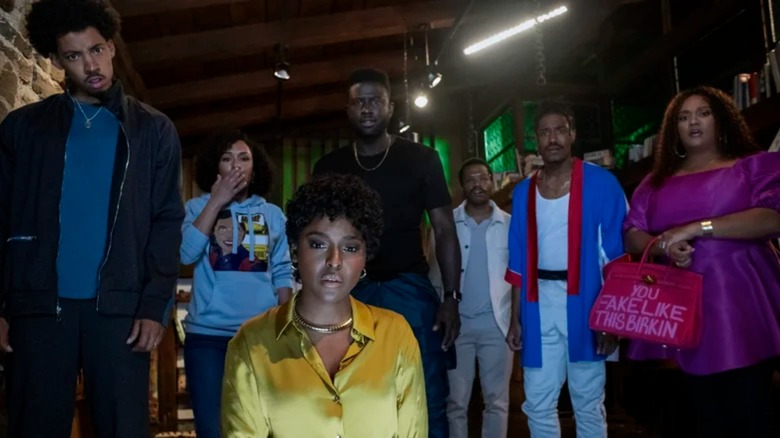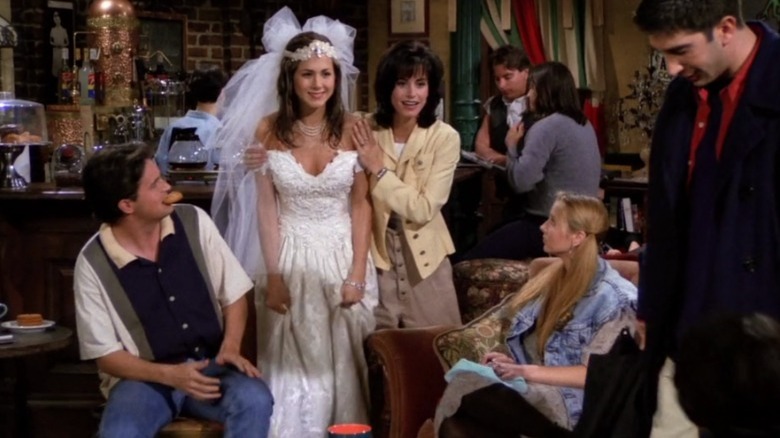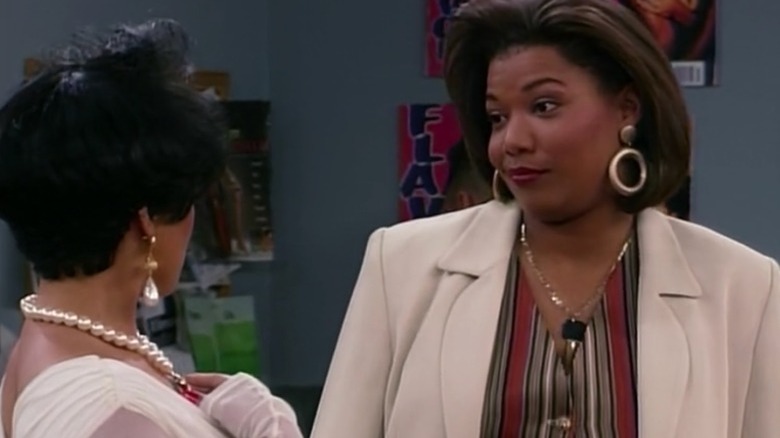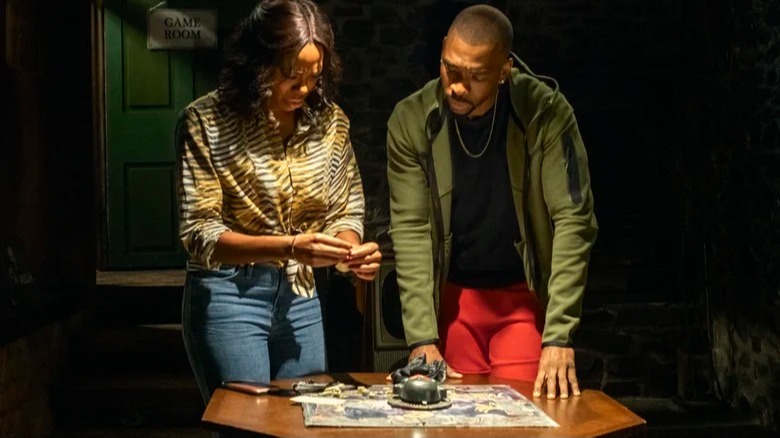The Blackening Takes A Hilarious Jab At Friends' Lack Of Diversity
It's no secret that "Friends" barely had any Black people. The beloved '90s sitcom has aged like sour milk in a few ways, from its persistent fatphobia to its poor take on trans identities. But while some issues can be shrugged off with claims that the powers-that-be didn't know any better, the lack of people of color was especially glaring, even during the show's initial run. In recent years, artists of color have addressed the whitewashed world of "Friends" in their own work, as in Quinta Brunson's recent "Saturday Night Live" monologue, or Jay-Z and Alan Yang's excellent "Moonlight" video, which reimagines an episode of the show with an all-Black cast.
Tim Story's horror comedy movie "The Blackening" takes aim at "Friends" too, in an extended bit that riffs not only on the show's lack of diversity but also on this film's central friend group's unwillingness to admit they even watch "Friends" in the first place. The movie, which is based on an uproarious 3Peat short film from 2018, follows a group of former school friends celebrating Juneteenth together at a rural cabin, where they're soon subjected to the taunting and torturous antics of a slasher-style bad guy. The killer uses a board game called The Blackening to determine which member of the group should die — a play on the horror movie trope that the Black character always dies first — testing each player's cultural Blackness. Then, during a life-or-death moment, the worst happens: it asks a question about "Friends."
Can you name six Black actors from Friends?
The scene in which Lisa (Antoinette Robertson), Dewayne (Dewayne Perkins), Alison (Grace Byers), Shanika (X Mayo), Clifton (Jermaine Fowler), Nnamdi (Sinqua Walls), and King (Melvin Gregg) have to name six Black actors who appeared on the 1994 sitcom is one of the film's best.
Though each participant initially hedges their answer with a disclaimer that they barely even watch "Friends," they eventually end up recalling six actors, including Gabrielle Union, Aisha Tyler, Janet Hubert (AKA the original Aunt Viv on "The Fresh Prince of Bel-Air"), and Phill Lewis, who they call "Mr. Moseby" after his role on "The Suite Life of Zack and Cody." In total, BuzzFeed counted 27 Black characters over the course of the show's 236-episode run, though many are unnamed extras, and Tyler was featured in the most episodes of any Black guest star with just 9 appearances.
In the end, the group gets the "Friends" question wrong, because the game board claims that the right answer to the question is actually "I don't know, I don't watch that show." The presumption here is that the "Blackest" thing to do is not watch "Friends" at all. The show took place in an insular bubble of white, comfortably well-off city living people — the group sometimes talked about being broke but lived in fantastic New York apartments.
And though it was a huge hit, it wasn't always a relatable one. It also holds an uneasy spot in TV history — and in Black pop cultural history — as it in many ways feels like an all-white rip-off of the Fox show "Living Single."
The Living Single effect
"Friends" hit the airwaves a year after "Living Single," and both Warner Bros.-produced shows followed the love lives, career moves, and misadventures of six young friends who lived in New York City, sharing an apartment. "Living Single" star Queen Latifah has claimed in multiple interviews NBC developed "Friends" as a result of "Living Single." And speaking to Vlad TV in 2020, co-star TC Carson said, "That's kinda what happens in Hollywood. We're always second-tier. I know Yvette [Lee Bowser] created [our] show, and they took that and created another one."
The juxtaposition of the two sitcoms is basically a case study of the ways in which Hollywood failed Black creators, stars, and audiences in the 20th century, and the comparisons were apparent even in the '90s. In 1996, Bowser pointed out the obvious contrast between one show's advertising and the other's, telling The LA Times, "It's disappointing that we have never gotten that kind of push that 'Friends' has had. I have issues with the studio and the network over the promotion of this show."
In a move that feels like something out of a satire about Hollywood, the LA Times piece even mentions a street in Los Angeles from which one could observe a massive billboard for "Friends," and a much smaller one with a picture from "Living Single" in the corner of it.
Friends definitely earned this jab
None of this is particularly funny, but the joke about "Friends" in "The Blackening" definitely is. The characters pretend not to have watched the show, but when the seconds start ticking down, it turns out most of them have an impressively encyclopedic knowledge of it. After all, that's kind of the whole thing about "Friends" — everyone's seen it, whether they actually like it or not. "The Blackening" is full of great moments like these, in which common perceptions about Black culture clash with the reality of each character's unique experiences, highlighting stereotypes and poking fun at them at once.
Horror-comedy skewering aside, the ubiquity of "Friends" has led to justified criticism of its lack of diversity in the years since it aired. "Friends" co-creator Marta Kauffman has finally acknowledged the bizarre lack of Black castmates in recent years. In 2022, she even put her money where her mouth is, pledging $4 million to Brandeis University's African and African American studies department.
"The Blackening" is currently in theaters. You can check out "Living Single" on Max (also the streaming home of "Friends") and Hulu.



